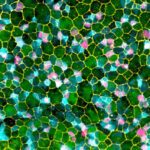Link to Pubmed [PMID] – 19646228
Genome Biol. 2009;10(7):R81
BACKGROUND: Addiction is a pathological dysregulation of the brain’s reward systems, determined by several complex genetic pathways. The conditioned place preference test provides an evaluation of the effects of drugs in animal models, allowing the investigation of substances at a biologically relevant level with respect to reward. Our lab has previously reported the development of a reliable conditioned place preference paradigm for zebrafish. Here, this test was used to isolate a dominant N-ethyl-N-nitrosourea (ENU)-induced mutant, no addiction (nad(dne3256)), which fails to respond to amphetamine, and which we used as an entry point towards identifying the behaviorally relevant transcriptional response to amphetamine.
RESULTS: Through the combination of microarray experiments comparing the adult brain transcriptome of mutant and wild-type siblings under normal conditions, as well as their response to amphetamine, we identified genes that correlate with the mutants’ altered conditioned place preference behavior. In addition to pathways classically involved in reward, this gene set shows a striking enrichment in transcription factor-encoding genes classically involved in brain development, which later appear to be re-used within the adult brain. We selected a subset of them for validation by quantitative PCR and in situ hybridization, revealing that specific brain areas responding to the drug through these transcription factors include domains of ongoing adult neurogenesis. Finally, network construction revealed functional connections between several of these genes.
CONCLUSIONS: Together, our results identify a new network of coordinated gene regulation that influences or accompanies amphetamine-triggered conditioned place preference behavior and that may underlie the susceptibility to addiction.

